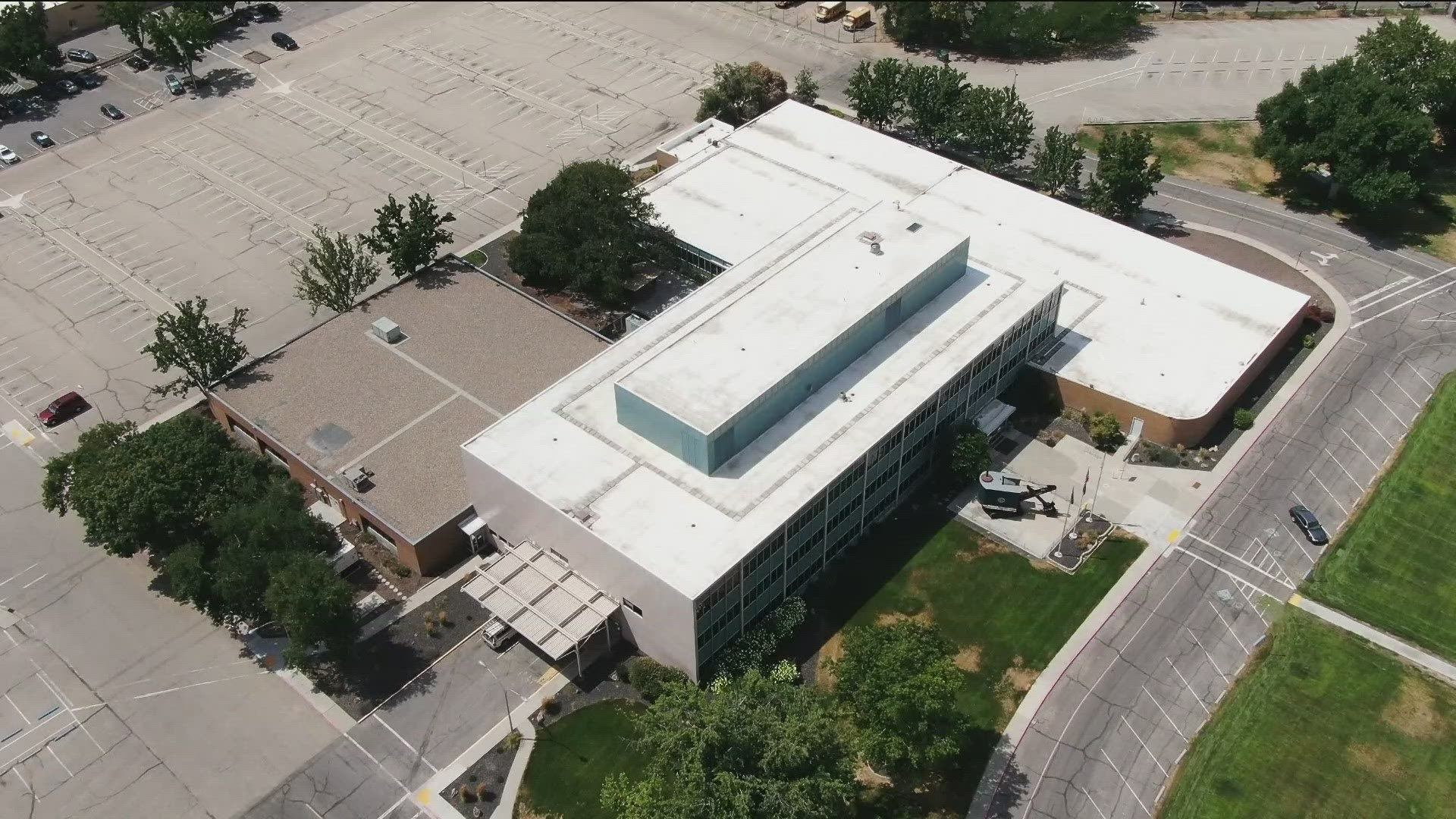BOISE, Idaho — This article originally appeared in the Idaho Press.
When Idaho lawmakers reconvened last month to consider legislation opposing the Biden administration’s proposed vaccine mandates, they introduced more than a dozen bills based on three key pieces of misinformation about COVID-19.
None became law, but the Idaho Medical Association, which represents more than 3,500 medical professionals across Idaho including more than 2,000 practicing physicians, last week sent three white papers to all 105 Idaho legislators aimed at providing the facts, and also has been holding meetings to bring regional lawmakers together with their local doctors to get their questions answered.
The three unfounded claims: That unvaccinated individuals are no more likely to spread the COVID-19 virus than vaccinated ones; that positive antibodies provide just as much protection from the virus as a vaccine; and that natural immunity from a past infection means a person doesn’t need to get vaccinated.
The antibody claim was specifically included in three bills introduced in November, including one Senate bill and two House bills; one of the measures, HB 415, passed the House on a 43-24 vote. The other two were SB 1224 from Sen. C. Scott Grow, R-Eagle; and HB 431 from Rep. Randy Armstrong, R-Inkom.
“We heard inklings of that piece of misinformation saying that positive antibodies are just as good a protection as a vaccine, which is absolutely false,” said Susie Keller, IMA executive director. “So we said, ‘Let’s run this to ground.’”
“Let’s have you all take a look at the most current literature and provide what we hope is some unbiased scientific information on which to make these decisions,” she said. “And there may be more white papers coming along, as we try to play this game of ‘Whack-a-Mole’ with these pieces of information that to a lay person make sense, but when you take a deeper dive and look at the science, (you) understand why that is not workable.”
HB 415, sponsored by Rep. Gayann DeMordaunt, R-Eagle, sought to create a new state law exempting from any employer vaccine mandate workers with medical, religious or other objections, or those who have a “documented history of COVID-19 infection or a positive antibody screen.”
The IMA, in its white paper issued Nov. 12, wrote, “An antibody test DOES NOT tell you whether you are immune to the virus that causes COVID-19 disease.”
“An antibody test MAY indicate whether you have been infected or vaccinated; testing is currently used in research settings but is not recommended for individual decision-making, such as whether to get vaccinated.”
The white paper adds, “One day, we may have a blood test that will show whether you are immune and protected from COVID-19, but we don’t have that test today.”
The most recent white paper was just released last week; it came in direct response to questions from senators at a Senate State Affairs Committee hearing on Nov. 17.
IMA lobbyist and attorney Ken McClure had just spoken against HB 419, Rep. Ron Mendive’s “don’t ask, don’t tell” bill, which sought to forbid any employer from asking about a worker’s COVID-19 vaccine status in any circumstance.
McClure, whose mother recently died, told the committee that under the bill, “If you have a personal need for personal health care in your home, you have an aged parent for example, and your aged parent has compromised health status, you can’t even ask if the nurse who’s coming in to be with your parent has been vaccinated. And I don’t understand the public policy behind that. … I think this is much, much too broad and a very dangerous piece of legislation.”
Senate Majority Leader Kelly Anthon, R-Burley, asked McClure, “What I understand in my limited knowledge of the COVID-19 vaccine is that once you receive it, you can still transmit COVID-19?”
“Senator, that’s correct,” McClure said, to which Anthon responded, “So I say to myself, what does it matter? … If in either instance, (the nurse) … can communicate that disease to your elderly mother, what does it matter? Help me understand what the issue is here, because I just don’t see it.”
McClure said, “The risk of transmission is significantly different between vaccinated and unvaccinated populations.”
Asked about the issue last week, Idaho state Epidemiologist Dr. Christine Hahn said, “What I struggle with is I think people want to see things very black and white, that you can transmit it or you can’t. It’s not a black-and-white. It’s ‘how infectious are you?’”
Hahn said scientific studies show that vaccinated people who get breakthrough COVID-19 infections clear the virus loads in their nose much more quickly than unvaccinated people. “Because they can clear that virus quicker, epidemiological studies looking at how do they spread in the household, for example, show that they do transmit to fewer people.”
But even more importantly, she said, “To me, the person who gets vaccinated is in a far better place. They are less likely to get COVID. If you don’t have COVID, you don’t spread it.”
The IMA’s latest white paper on the topic is headed, “Is it true that vaccinated persons spread the coronavirus just as much as the unvaccinated? The short answer is ‘no.’”
The paper, citing a 2021 study in Los Angeles County, says, “Limiting your close contacts to persons who are fully vaccinated means that your chances of being exposed to someone who is infected are reduced on the order of 80%, compared to having close contacts with those who are unvaccinated.”
It cites studies in the U.K. and the Netherlands earlier this year that showed that if you’re vaccinated and get a breakthrough infection, you are “significantly less likely to infect other members of your household than if you were not vaccinated.”
And it noted the same factor Hahn cited: That fully vaccinated people with breakthrough infections clear the virus from their nose and throat “much more quickly compared to people who are unvaccinated.”
“Protecting your family and close contacts is another reason to get vaccinated today,” the IMA’s paper concludes. “The vaccines are safe, effective and free.”
Senate President Pro Tem Chuck Winder, R-Boise, said, “I think any specifics we can get, through white papers, through these professionals, will be helpful in educating all of us on what are the facts and what are the risks.”
He praised the IMA’s move to hold meetings with regional legislators and their local doctors who they know. “I think that’s where it needs to happen,” he said. “Legislators need to be able to talk to their own doctors, talk to the doctors in their community, because I think that generates more trust than just an organization saying something.”
He noted, “And then you’ll have others that will continually reject that, because it doesn’t fit into their basic parameters of what they believe about the vaccine, or what they think they’ve been told about the vaccine.”
“There’s plenty of evidence that you are going to get sick less, you are going to have less severe health implications if you are vaccinated,” he said. “I think it all came down to the information that we see in social media, and people will take a little bit of information and turn it the way they want it. … There are those people that are saying, ‘What difference does it make if I get vaccinated?’ So I think we’re just trying to figure out ways to communicate with those people and provide the best information that we can provide. And because there are no mandates in Idaho, people can still make up their own minds.”
The IMA published its first white paper on Oct. 15, when its public health committee researched the question of natural immunity vs. vaccine-induced immunity.
“If you previously had COVID, we cannot tell you how much or little protection you may have against getting COVID again, and whether getting the virus again might cause more severe disease,” that paper said.
The paper said there is conflicting data coming in from studies examining the strength and durability of natural immunity after COVID infection. “It should be noted that natural immunity is unpredictable — some people develop more protection for a longer period of time than others,” the paper says.
It also noted, “Getting COVID and developing natural immunity is far more dangerous than getting vaccinated and developing vaccine-induced immunity.”
“For those who had COVID, we do not know how long the protection will last and how effective it will be against future types of the disease,” the paper said.
Since that paper was issued, the new omicron variant has emerged and raised even more questions.
A new report from South Africa showed “worrisome” signs, Hahn said, that omicron is more resistant to vaccines, though it still provides some protection against infection and more protection against severe illness. But little protection against omicron was found from prior infection, Hahn said.
The state epidemiologist said her “favorite study to cite” is a Kentucky study published by the U.S. Centers for Disease Control that looked at a large group of people who all had COVID and then followed them over time. “Some of them got vaccinated, decided they wanted to get vaccinated, and some of them did not,” she said.
“What they showed was the folks that went ahead and got vaccinated even after COVID were significantly protected against reinfection, compared to people that said, well, for whatever reason, ‘I’m not going to get vaccinated.’ It showed that natural immunity can be helped out, can be added to by getting a vaccine.”
Winder said, “What we saw in that three-day session in November will be a preview, probably, for what we’ll see in January.”
Keller agreed. “We’re ready to buckle up,” she said.
She said the IMA is having “good exchanges” with lawmakers, both in response to the white papers and in the local meetings.
“For those who are not inclined to want to listen to scientific experts from the medical community, I’m not sure it makes that much difference,” she said, “but for those who are not sure who to believe, what we hope is that hearing solid scientific information from a group of Idaho doctors will help lead them in the right direction.”
“Our hope would be that any decision makers or policy makers would look to local medical experts and actually people who take care of COVID patients,” Keller said. “We’re looking at all of the available science, and we’re trying to be that trustworthy source.”
This article originally appeared in the Idaho Press. Read more at IdahoPress.com
Watch more Local News:
See the latest news from around the Treasure Valley and the Gem State in our YouTube playlist:



